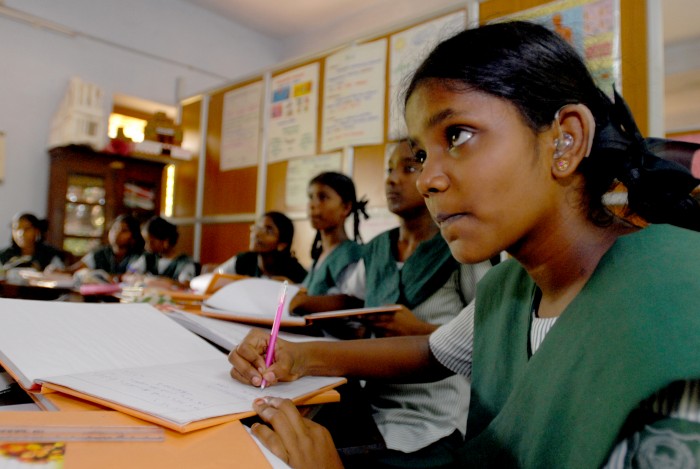Celebrating a year of impact, Educate Girls on track to deliver promising results in Rajasthan

Photo by Pippa Ranger/Department for International Development.
A year ago, Global Business Coalition for Education sat down with Ranajoy Basu, Partner at member company Reed Smith, to demystify the buzz around impact bonds. Through our Q&A, Basu explained the promising benefits of results-based financing and the allure and potential risks for these public-private partnerships.
Basu worked on the world’s first ever Development Impact Bond (DIB) for education in Rajasthan, India. What makes a development impact bond distinct from a social impact bond is that a third party supplements the government’s payments for outcomes, instead of a government actor that is the outcome funder in a social impact bond.
The question remains whether the Educate Girls DIB, the first of its kind, will deliver on its promise. One year into the three year pilot, the results indicate a strong trajectory towards ‘yes’.
Educate Girls, an NGO and the service provider in this bond, is working to reduce staggering statistics of out of school girls and improve educational attainment for youth across Rajasthan, India. Over the past eight years, Educate Girls has expanded from 50 schools to 12,500, enrolling 120,000 out of school girls and improving educational outcomes among 650,000 children.
Piloting the use of a DIB to accelerate their already fast-moving growth, Educate Girls’ Founder and Executive Director Safeena Husain emphasizes that utilizing this financing mechanism offers a unique solution to “maintain focus on quality and impact [while] hyper-scaling.” Just one year into the pilot, Educate Girls has enrolled 44% of its total targeted out of school girls and has accelerated learning gains by 30%.
“We are very lucky to have been given the opportunity to work on this innovative financing and are excited by the Development Impact Bond as an innovative way to attract private sector funding to address critical social issues around the world. The successful performance of the Educate Girls DIB will undoubtedly help in scaling up transactions and also demonstrate that such ‘pay for performance’ structures can be used as an innovative way of delivering positive impact across a range of issues, such as education of children in emergencies while at the same time providing the level of incentive required to unlock the true potential of private sector funding,” says Basu, who represented Reed Smith as a consulting partner in drafting the contractual agreements for the DIBs.
Phyllis Costanza, CEO at UBS Optimus Foundation, (the investing partner), further emphasizes that DIBs demonstrate how private capital can complement and enhance existing funding streams by encouraging impact achievement while generating financial returns. Already, UBS has recouped an estimated 40% of their initial $267,000 investment.
“It is great to see that the legal framework put together for this ground breaking transaction is working and delivering social impact. The transaction exemplifies that cross border funding solutions can be achieved to deliver social impact and it is hoped that a positive performance in year one will encourage private sector investors to support social impact finance projects to a greater degree. We are excited about the potential to replicate similar structures to address complex social issues around the world,” says Basu.
Costanza is clear to distinguish that DIBs are not a replacement for current international investments and further noted that DIBs may not be effective in every scenario. To facilitate success, the DIB must be implemented in an environment that has sufficient baseline data, a real capacity to implement, and the ability to target measurable and time-bound results. In addition to direct investment, the private sector is positioned to foster this capacity building by investing in efforts that expand design, implementation, and evaluation expertise.
While concerns regarding the high transaction costs of implementing this DIB may linger, it is important to keep in mind that much of this resulted from the complex problem solving and innovation that was necessary while charting unprecedented territory. With increased investment, the business community can build on the lessons learned and establish a foundation for economies of scale.
The investments needed to achieve inclusive and equitable education for all the world’s children and youth are great, but the costs of not investing in education and leaving our children and future workforce behind are far greater. With thoughtful design, strong performance management, and tangible results, every dollar invested in a DIB can be guaranteed a social and financial return. That is a smart investment.
